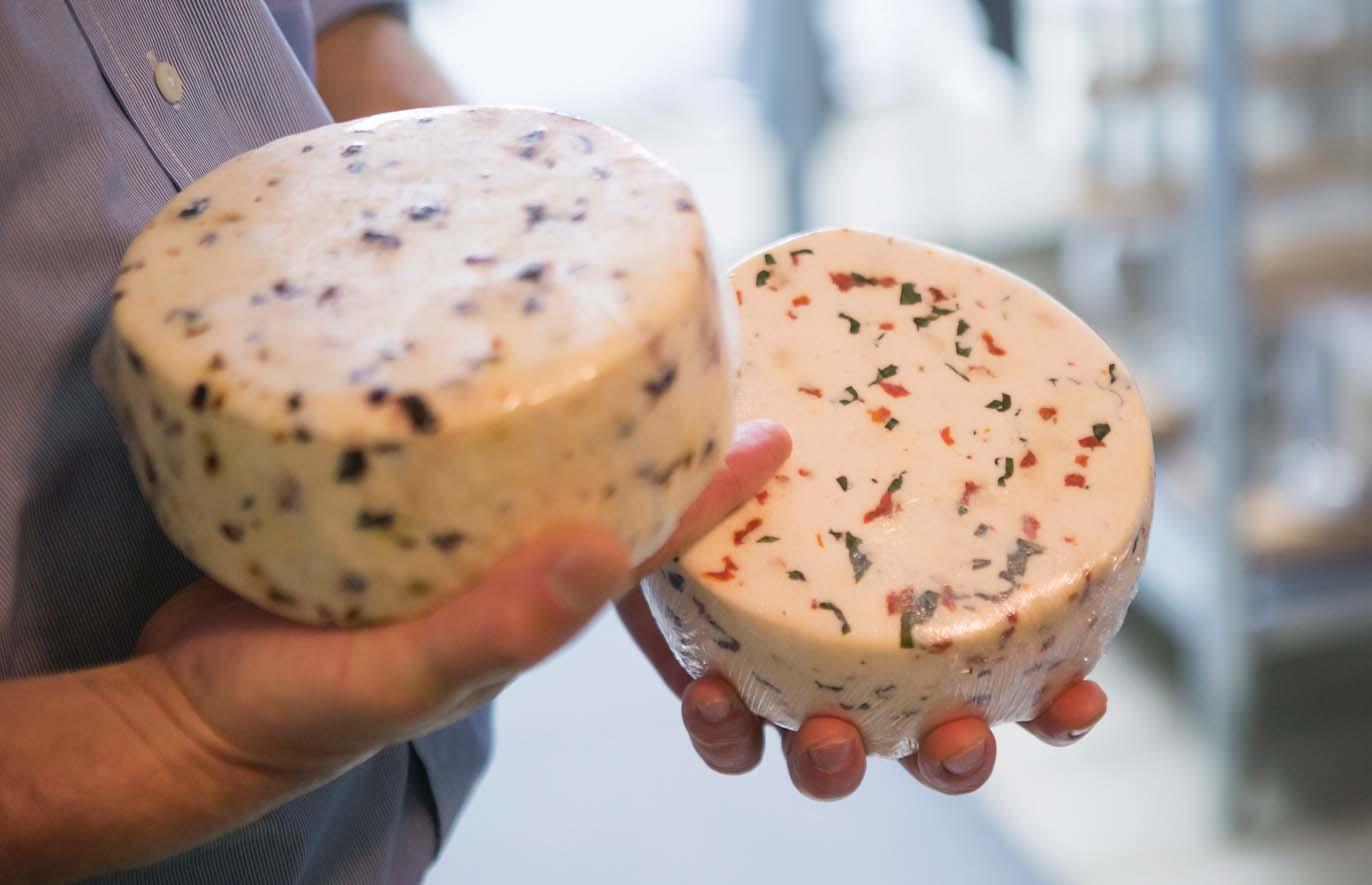
9 minute read
AT THE TABLE
Cultivating CULTURE

Advertisement
Local creameries make a name for themselves
by COLLEEN THOMPSON photography by MADELINE GRAY
at the TABLE
According to Arabian legend, cheese was created by accident. A merchant put his milk into a pouch made from a sheep’s stomach, and set out on a journey across the desert. The rennet in the pouch’s lining combined with the sun’s heat separated the milk into curd and whey. That night, he discovered that the whey satisfied his thirst, and the curd satisfied his hunger. Centuries later, gourmands and foodies have seasoned their palates from the mundane of Monterey Jack or mild cheddar and expanded to include the delights of bold, stinky, and nutty flavors. Terms like ‘washed-rind,’ ‘alpine,’ and ‘mold-ripened’ have crept into our lexicon. North Carolina is getting cheesier thanks to a number of artisanal farmhouse operations. As new farms pop up each year, the region is quickly occupying more counter space nationwide. To celebrate and support the local dairy, makers throughout the state formed the North Carolina Cheese Trail. The trail encourages visitors to spend an afternoon, weekend, or an entire vacation tasting local cheese, connecting with cheesemakers, and enjoying the state’s scenic farmlands. There are currently 29 cheesemakers along the trail—each creating different products, carving out a niche for themselves, and gathering a loyal following along the way.
For the love of cheese “I believe true artisan cheesemaking is when a skilled cheesemaker creates and ages small batches of cheese from a local dairy herd (cow, buffalo, sheep, or goat), allowing seasonal and environmental variations in milk composition and flavor to be expressed,” says Richard Nathan, founder of Raleigh’s Second Act Artisan Cheese. Nathan began his career as a certified public accountant and portfolio manager before taking a sharp turn to cheesemaking. “I started making cheese in my spare time as a serious hobby, with the expectation that it might become a second career once I retired from my day job.” He began taking a few weekend cheesemaking workshops, completed an intensive program at the Sterling College Artisan Cheese Institute in Vermont, as well as an advanced program at Westminster Artisan Cheese Making. Three years ago, Nathan founded Second Act Artisan Cheese, with the goal of offering workshops to hobbyists, foodies, and any Raleighite interested in learning more about the craft. It turns out that you don’t need expensive equipment to make really good cheese in your own kitchen.
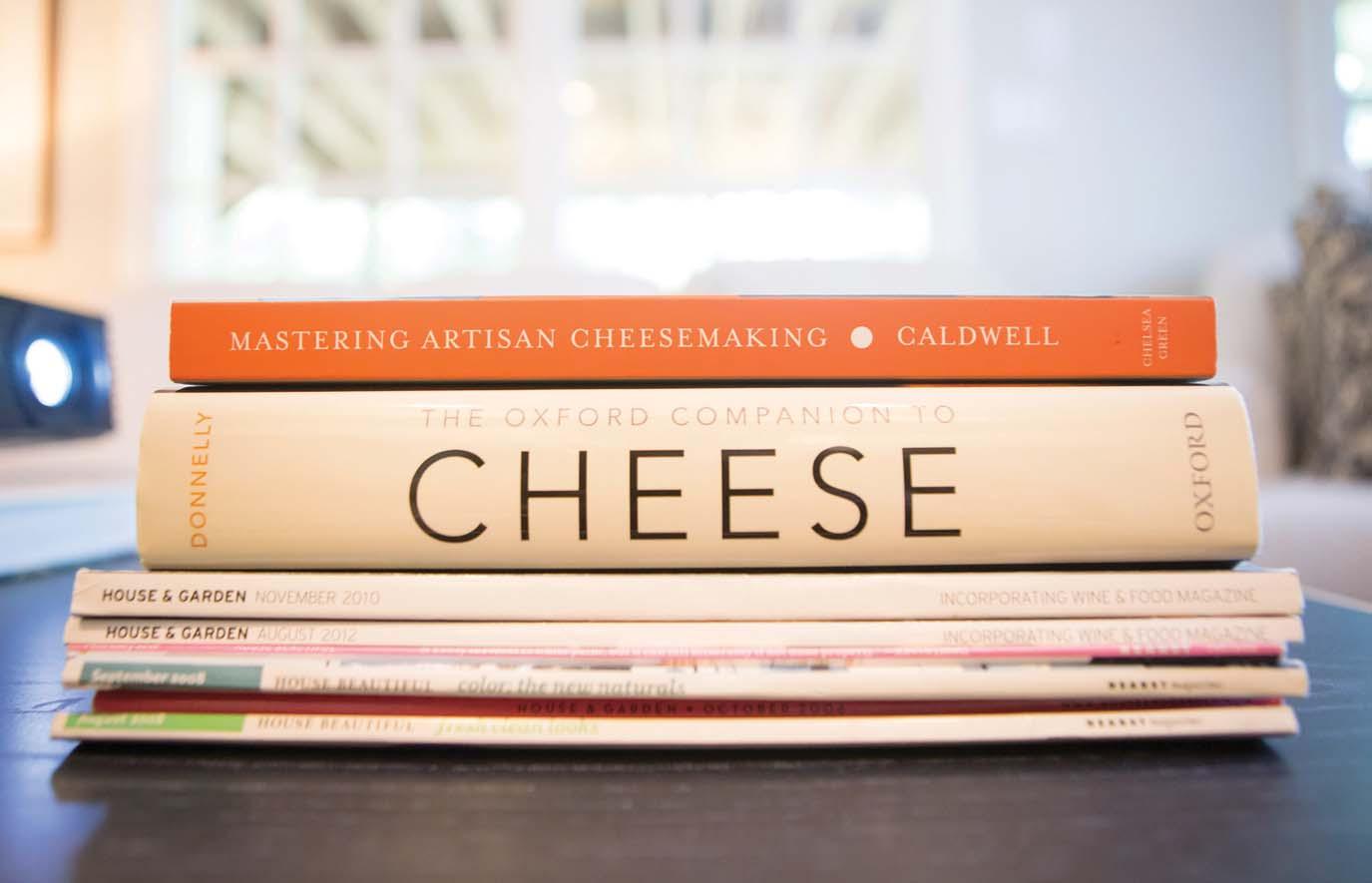
All you need is a little motivation, knowledge, and practice, he says. “My goal is to raise awareness in the area about all the cheeses made by local producers in North Carolina,” Nathan says. “I’ve found that once people try making cheese for themselves, they develop a new appreciation for what’s available locally.” Second Act mainly produces hard cheese, and Nathan says he likes the control he has over a longer-aged product. “I also like to make cheeses that are difficult to find in the stores, like English clothbound cheddar, English Red Leicester, and Stilton styles. Our Dry Aged Jack is special because the rind is covered with an olive oil, crushed coffee, black pepper and cacao rub—it’s extremely complex and flavorful because of the rind,” says Nathan. “The true cheesemaker will tell a culinary story of the local terroir in their cheese, including the forage on which the animals graze.” Each cheese is an expression of the farm it comes from—that link between flora, fauna, soil and milk is integral to cheesemaking. “Artisan cheesemakers let the milk dictate how the cheese will be made and aged which invariably leads to variations in taste across the seasons,” says Nathan.
Content cattle Happy cows produce better milk. Better milk makes better cheese. That simple belief prompted North Carolina natives Flo Hawley and Portia McKnight to purchase 37 acres of land in West Chapel Hill and launch Chapel Hill Creamery. They cleared the land, converted 28 acres to pasture with a grassy mix, and purchased nine Jersey cows—a smaller breed that generally produce rich, creamy milk. McKnight says the care and dedication to raising happy, healthy cows has always been the driving force behind the creamery’s ethos. “We are certified by Animal Welfare Approved, which is the most stringent of the farm animal welfare certification programs. We committed to healthy, happy cows from the beginning,” says McKnight. “My favorite cow—don’t tell the others—is Andrea. She is named after Andrea Reusing of Lantern Restaurant
THE PROCESS clockwise from top left: Marlene McCauley, Maggie McDowell, Lisa Richardson, and Gail Webster make queso fresco in a beginners cheesemaking workshop; Richard Nathan, founder of Second Act Artisan Cheese, leads cheesemaking workshops for all skill levels in Raleigh and drains a batch of fromage blanc; Melissa Dollman chops up chives to add to the queso fresco; Richard Nathan ties up a batch of fromage blanc to drain; Richard Nathan spreads a piece of butter muslin over a bucket to drain cheese curds; Cheese curds for queso fresco are strained through butter muslin before being mixed with various ingredients and pressed into a wheel; Cheese curds are tested for making queso fresco; Rachel Clark, left, spoons curds for queso fresco into a press as Melissa Dollman, right, holds the butter muslin; a finished block of cheese
and The Durham Hotel. She was born in March of 2007—daughter of Audrey, granddaughter of Allison, and great granddaughter of Miss Ada, our original cow. Andrea has been affectionate and playful since she was a calf and she’s especially photogenic,” says McKnight. The herd has since grown to 30 grassfed, happy cows that have rewarded the creamery greatly—their selection of seven cheeses a testament to that. “We have a core list of four cheeses: Carolina Moon, a Camembert-style cheese; Calvander, inspired by Asiago; Hickory Grove, a silky, meltable cheese; and fresh Mozzarella, which is a summertime feature,” says McKnight. Calvander, named for a crossroads where a nineteenth-century schoolhouse sits, has gone on to win three Best in Show prizes at the North Carolina State Fair, as well as a World Jersey Cheese Award and a North American Jersey Cheese Award. “Cheese is an incredibly fascinating food, because milk is almost 100 percent of the composition, but there are so many different cheeses that can be made from that one ingredient,” says McKnight. “As we explored the possibility of cheese making, we found it compelling to start from the ground up—from the sun and soil, building our herd health and creating outstanding milk quality to ultimately make great cheese.” Farming formaggio The unconventional life of owning a cheese farm—a life of seemingly calm sunshine days, bleating goats, and an endless supply of chevre—is a reality for brother and sister duo Austin and Samantha Genke. Just north of Hillsborough stretches Carr Store Road in Cedar Grove, N.C., where the Genke siblings co-own and operate Boxcarr Handmade Cheese. Born and raised in Vero Beach, Florida, Austin Genke attended the Culinary Institute of America in Hyde Park, New York, while Samantha Genke headed to North Carolina and spent a decade learning at Goat Lady Dairy in Climax, as well as Chapel Hill Creamery. Longing for country life and hoping to move closer to family, Austin Genke and his wife Dani bought a small farm to raise chickens and plant vegetables. Samantha Genke already lived across the road, and raised a small herd of goats. “We moved to North Carolina to be closer to family, to sit around the dinner table and share meals,” says Austin Genke. The idea of starting a creamery and making cheese came afterwards. They started a Kickstarter campaign in 2015 to raise enough funds to build a creamery on the farm.
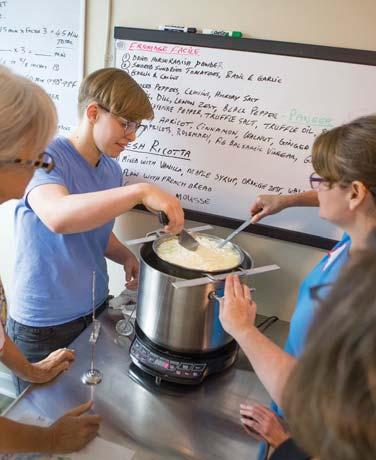
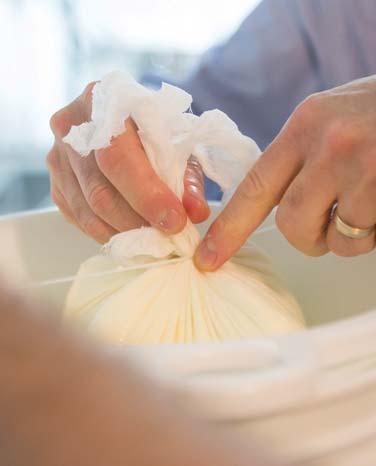
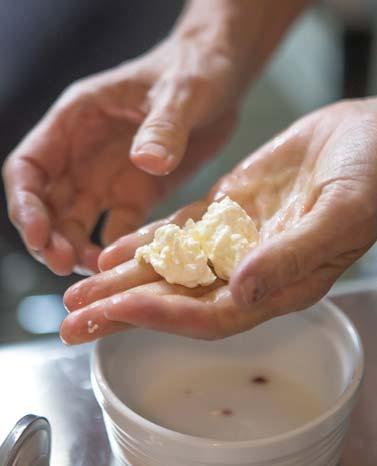
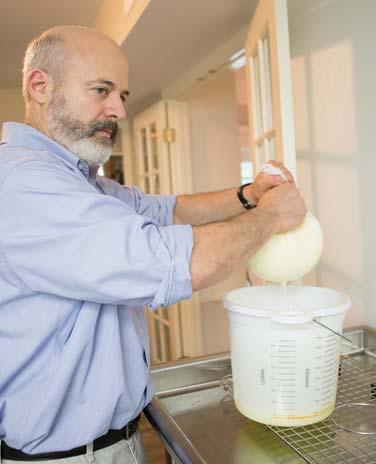
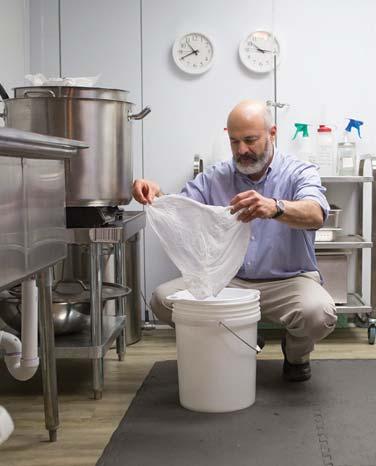
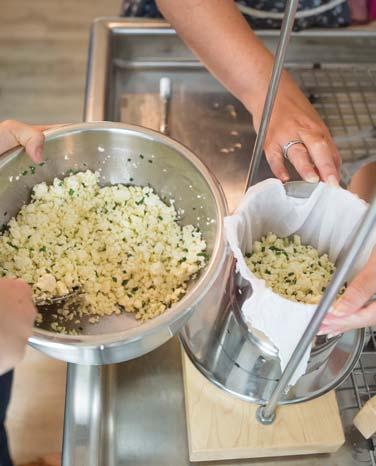
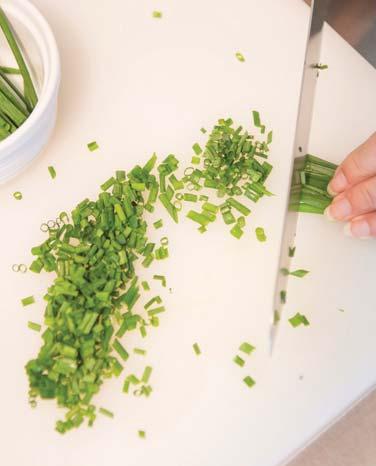
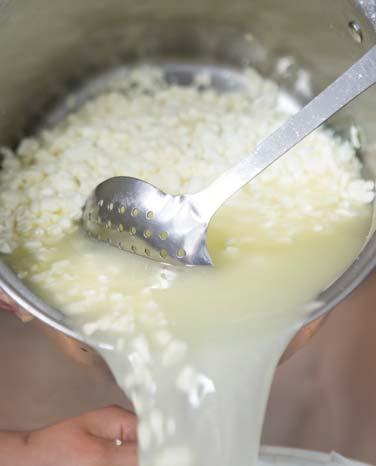
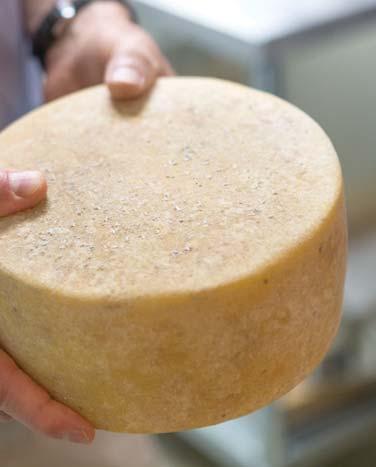
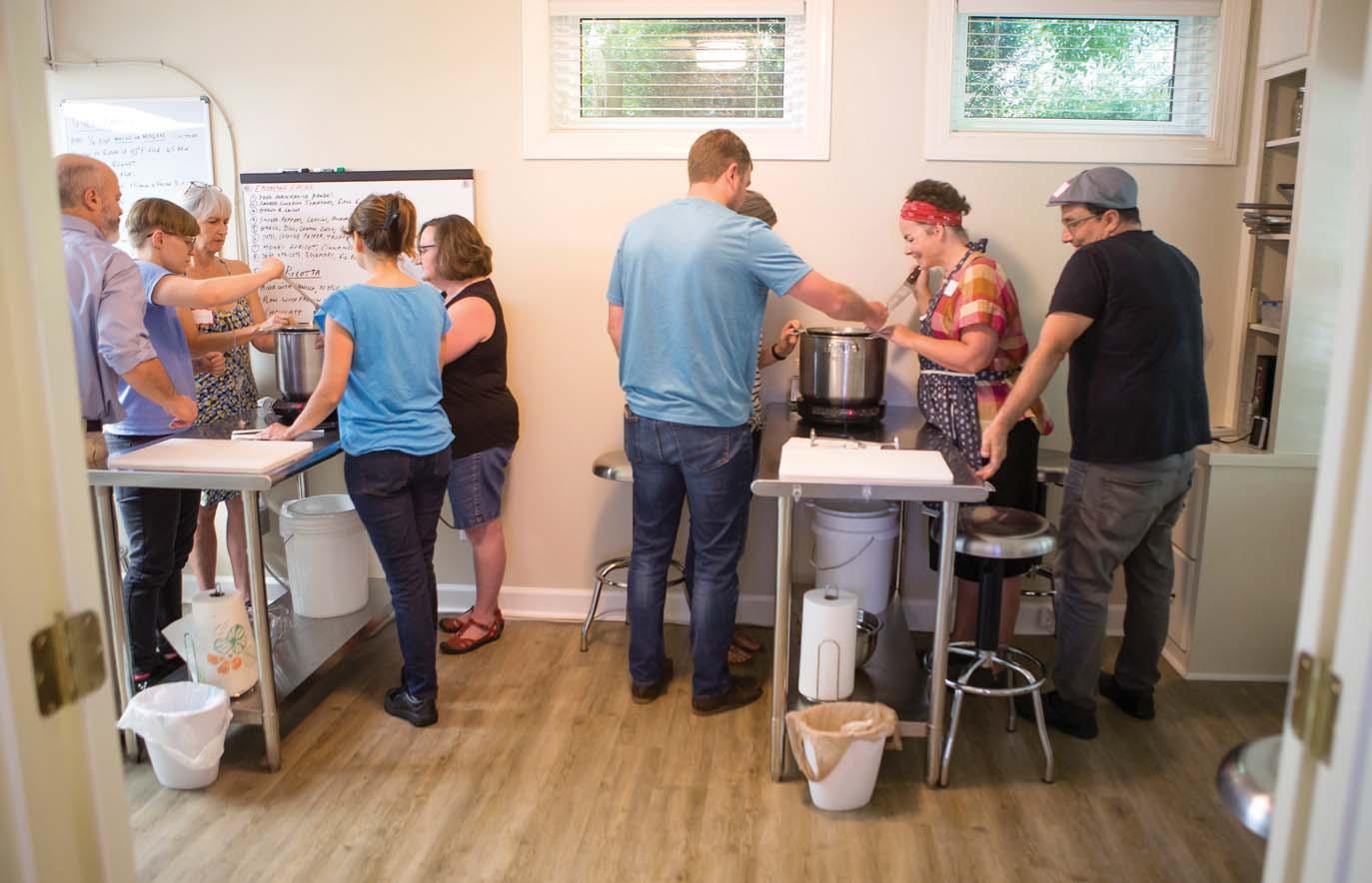
They arranged to source milk from other small farms: Jersey and Holstein cow’s milk from a neighbor as well as Alpine and Nubian goat’s milk from a friend’s farm. Inspired by their family roots in the Piedmont and in Sicily, they set out to make Italian-inspired farmstead cheeses. They recruited the expertise of longtime friend Alessandra Trompeo, a cheesemaker from Northern Italy, and traveled to Trompeo’s birthplace to study the different styles of cheese, spending months experimenting and taste testing. Samantha Genke now produces cheese modeled on those from Northern Italy, like Robiola and Taleggio using a unique selection of cultures. The handcrafted cheeses are catching the attention beyond the Tar Heel State, finding their way to New York, Chicago, and San Francisco. Boxcarr now produces nine varieties of cheese, with additional seasonal flavors. Cottonseed is one of Boxcarr’s top sellers and uses a blend of milks that results in a creamy, decadent cheese. There’s also Rocket’s Robiola, named after one of their goats, and made from a silky cow’s milk with an ash-dusted rind and hints of almond and mushroom. “Consumers want better tasting, unique products, and this desire has created a real demand for artisanal and local products,” said Austin Genke. “It’s affected the cheese business as well as craft beer and other specialized food products. With initiatives like the N.C. Cheese Trail, it helps promotion and awareness.” A deep love for cheese motivates these cheesemakers to continue the process and promote the delicious product. “As consumers we have the ultimate power to decide which cheesemakers thrive and which ones eventually fade away,” says Nathan of Second Act Artisan Cheese. “My hope is that at the very minimum, we seek out locally made artisan cheeses to help support our emerging cheesemakers.”
SPREADING THE LOVE
Richard Nathan hosts a beginner cheesemaking workshop at his home in Raleigh.
CHEERS to CHEESE FEST
OCTOBER 7
The N.C. Cheese Trail is celebrating Southern cheesemakers October 7 at the Grove Winery & Vineyards in Gibsonville, North Carolina. Sample and purchase cheese as you talk with cheesemakers— Grove’s tasting room will also be open for tasting, shopping, or to enjoy a glass of wine on their patio. Learn more about the N.C. Cheese Trail and pick up free brochures or dairy-themed items for adults and children alike. The event is free, complete with live music and local food trucks.
grovewinery.com









